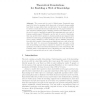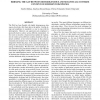23 search results - page 3 / 5 » Using the Web to Construct Taxonomy for a Heterogeneous Comm... |
FOIKS
2010
Springer
14 years 18 days ago
2010
Springer
The current web is a web of linked pages. Frustrated users search for facts by guessing which keywords or keyword phrases might lead them to pages where they can find facts. Can w...
IPL
2002
13 years 5 months ago
2002
One of the main reasons for using parallel evolutionary algorithms (PEAs) is to obtain efficient algorithms with an execution time much lower than that of their sequential counter...
WWW
2004
ACM
14 years 6 months ago
2004
ACM
We present a Semantic Web application that we call CS AKTive Space1 . The application exploits a wide range of semantically heterogeneous and distributed content relating to Compu...
DEXAW
2010
IEEE
13 years 6 months ago
2010
IEEE
The Web has been flooded with highly heterogeneous data sources that freely offer their data to the public. Careful design and compliance to standards is a way to cope with the he...
EKAW
2008
Springer
13 years 7 months ago
2008
Springer
With the advent of the Web and the efforts towards a Semantic Web the nature of knowledge engineering has changed drastically. In this position paper we propose four principles fo...


